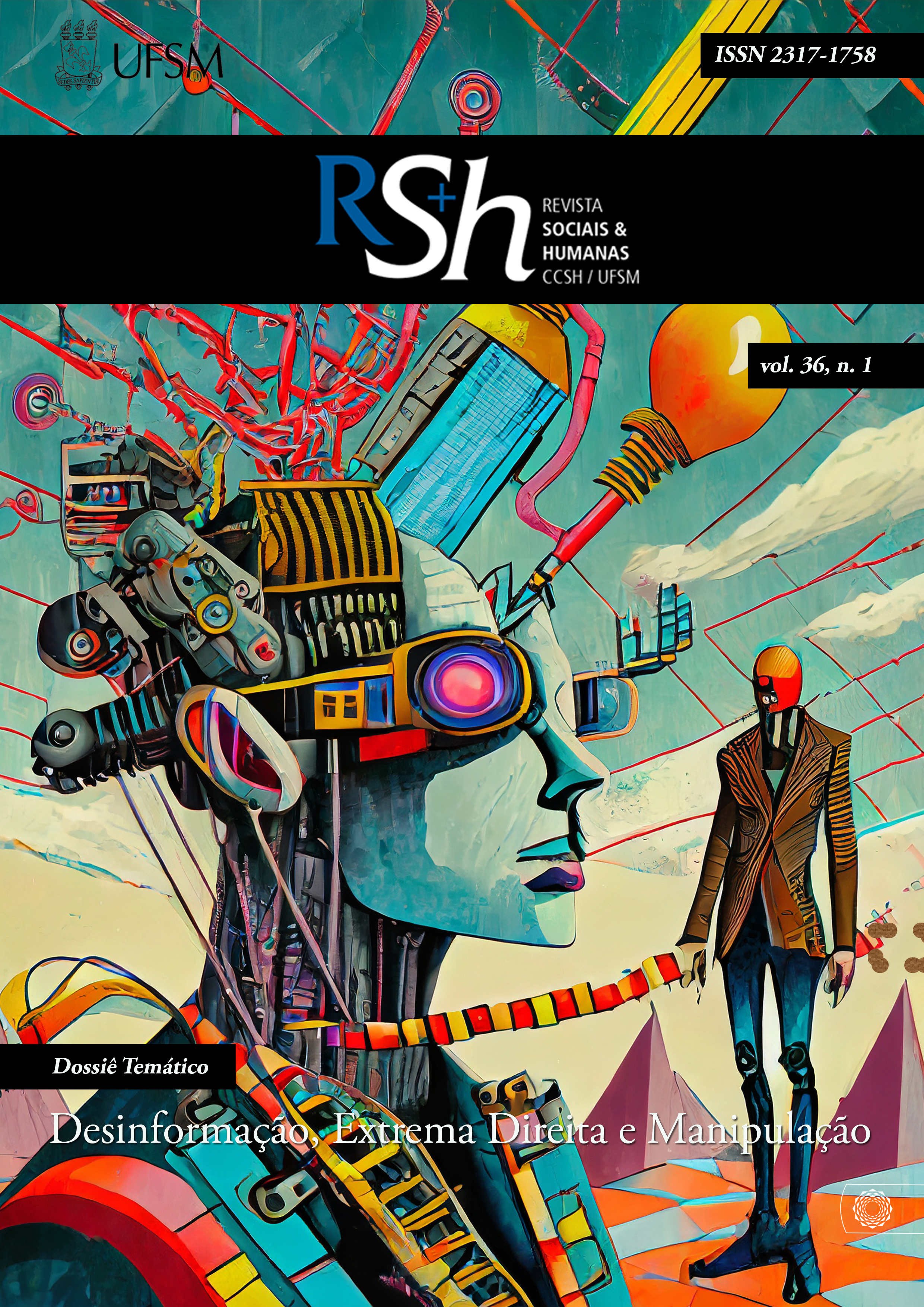Democracy and political communication in post-truth times
DOI:
https://doi.org/10.5902/2317175874584Keywords:
Political communication, Democracy, Digital social networks, Post truthAbstract
The increasingly frequent access to digital social networks is provoking a new modus operandi for the practice of communication and political conflict. The purpose of this article is to investigate and reflect on this process of change, which is so expensive to the rules of the democratic game. The method employed is comparative, with descriptive and explanatory analyses, and uses data from the Latinobarómetro Consortium and the World Values Survey (WVS). The hypothesis is that the shift of political conflict towards these new tools has contributed to communication strategies that focus on the relativization of political facts and the deconstruction of traditional narratives gaining prominence. Digital social networks gradually change the logic of communication in political conflict, and respond to part of the discomfort currently caused in liberal democracies by promoting channels for the evasion of narratives arising from populist authoritarianism.
Downloads
References
BAUMAN, Zygmund. Modernidade líquida. Rio de Janeiro: Jorge Zahar Ed., 2001.
BOURDIEU, Pierre. Sobre a televisão. Rio de Janeiro: Jorge Zahar Ed., 1997.
CARR, Nicholas. Is google making us stuping?: what the internet is doing to our brains. 2008. The Atlantic. Disponível em: https://www.theatlantic.com/magazine/archive/2008/07/is-google-making-us-stupid/306868/. Acesso em: 24/08/2023.
CONTRAFOGOS: táticas para enfrentar a invasão neoliberal. Rio de Janeiro: Jorge Zahar Ed., 1998.
CONVERSE, Philip E. The nature of belief systems in mass public (1964). Critical Review, v. 18, n. 1-3, p. 1-74, 2006.
DAHL, Robert A. A moderna análise política. Rio de Janeiro: Lidador, 1970.
DEIBERT, Ronald J. Reset: reclaiming the internet for civil society. Toronto: House of Anansi Press, 2020.
DEMOCRATIC deficit: critical citizens revisited. Spring: Cambridge University, 2011.
FOA, Roberto Stefan. Why strongman win in weak states. Journal of Democracy, v. 32, n. 1, p. 52 - 65, jan., 2021.
FUKUYAMA, Francis. Make the internet safe for democracy. Journal of Democracy, v. 32, n. 2, p. 37 - 44, apr., 2021.
HARRIS, Tristan. How technology is hijacking your mind — from a magician and Google design ethicist. 2016. Medium. Disponível em: https://medium.com/thrive-global/how-technology-hijacks-peoples-minds-from-a-magician-and-google-s-design-ethicist-56d62ef5edf3. Acesso em: 07/08/2023.
HART, Michael, H. As 100 maiores personalidades da história: uma classificação das pessoas que mais influenciaram a história. Rio de Janeiro: DIFEL, 2002.
HERMET, Guy. A democracia. Lisboa: Ed. Piaget, 1997.
HOFFMANN, Fábio; SANTOS, Everton Rodrigo. Os jingles como formas simbólicas estratégicas de persuasão político-eleitoral. Cadernos do Tempo Presente, v. 8, n. 4, p. 27-38, jul.-dez., 2017.
HOW social media is ruining politics. 2015. Politico. Disponível em: https://www.politico.com/magazine/story/2015/09/2016-election-social-media-ruining-politics-213104?paginate=false. Acesso em: 22/08/2023.
WHY Trump tweets (and why we listen). 2018. Politico. Disponível em: https://www.politico.com/magazine/story/2018/01/26/donald-trump-twitter-addiction-216530. Acesso em: 06/08/2023.
IDEOLOGIA e cultura moderna: teoria social crítica na era dos meios de comunicação de massa. Petrópolis: Vozes, 2011.
IN Praise of skepticism: trust but vefiry. New York: Oxford University Press, 2022.
INGLEHART, Ronald. The cultural backlash: Trump, Brexit e and the rise of authoritarianism populism. New York: Cambrige University Press, 2019.
INGLEHART, Ronald; NORRIS, Pippa. Trump and the populist authoritarian parties: the silent revolution in reverse. Perspectives on Politics, v. 15, n. 2, p. 443-454, jun., 2017.
JENKINS, Henry. Cultura da convergência. São Paulo: Aleph, 2009.
KEYES, Ralph. The post-truth era: dishonesty and deception in contemporary life. Londres: Macmillan, 2004.
LEFORT, Claude. A invenção democrática: os limites da dominação totalitária. São Paulo: Ed. Brasiliense, 1987.
LIPOVETSKY, Gilles. Os tempos hipermodernos. São Paulo: Editora Barcarolla, 2004.
LYNCH, Marc. After the arab spring; how the media trashed the transitions. Journal of Democracy, v. 26, n. 4, p. 90 - 99, oct., 2015.
MARKOFF, John. Democracia: transformações passadas, desafios presentes e perspectivas futuras. Sociologias, vol. 15, n. 32, p. 18-50, 2013.
MENDONÇA, Daniel de. Antagonismo como identificação política. Revista Brasileira de Ciência Política, n. 9, p. 205-228, sept./dec., 2012.
MORAIS, Jennifer Azambuja de; COSTA, Andressa Liegi Vieira; Bernardi, Ana Julia Bonzanini. Populismo, polarização política e a pandemia do coronavírus: Donald Trump e a opinião pública nos Estados Unidos. Debates, v. 14, n. 3, p. 126 - 149, set.-dez., 2020.
MORRIS, Dick. Jogos de poder. Rio de Janeiro: Record, 2004.
NORRIS, Pippa. The Growth of critical citizens?. In: Norris, P. (ed.). Critical citizens: global support for democratic governance. New York: Oxford University Press, 1999.
POLIARQUIA: participação e oposição. São Paulo: Edusp, 2012.
SOBRE a democracia. Brasília: Editora Universidade de Brasília, 2016.
SENNETT, Richard. A corrosão do caráter: consequências pessoais do trabalho no novo capitalismo. Rio de Janeiro: Record, 2003.
THOMPSOM, John B. O escândalo político: poder e visibilidade na era da mídia. Petrópolis: Vozes, 2002.
TILLY, Charles. Democracia. Petrópolis: Ed. Vozes, 2013.
Downloads
Published
How to Cite
Issue
Section
License
Copyright (c) 2023 Revista Sociais e Humanas

This work is licensed under a Creative Commons Attribution-NonCommercial-ShareAlike 4.0 International License.
Os direitos autorais para artigos publicados nesta revista são do autor, com direitos de primeira publicação para a revista. Em virtude de aparecerem nesta revista de acesso público, os artigos são de uso gratuito, com atribuições próprias, em aplicações educacionais e não-comerciais. A revista permitirá o uso dos trabalhos publicados para fins não-comerciais, incluindo direito de enviar o trabalho para bases de dados de acesso público. Os artigos publicados são de total e exclusiva responsabilidade dos autores.


